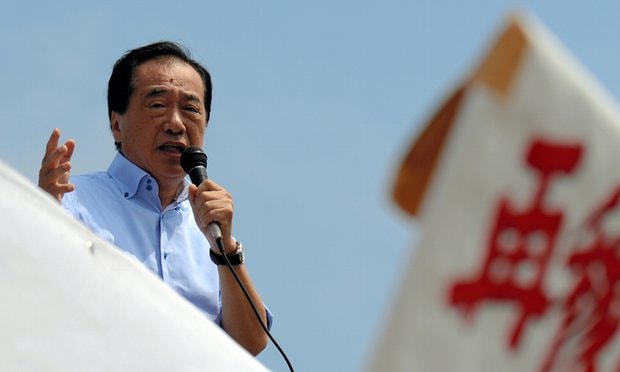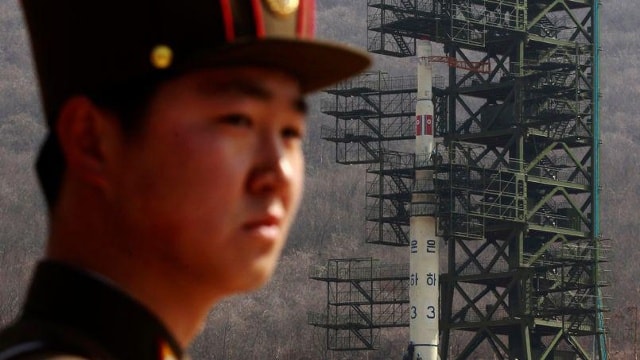The world and nuclear energy
(Baonghean) - Nuclear energy - true to its name - seems to be the core of many problems that are currently plaguing the world chessboard. Politically, economically, militarily,... the presence of nuclear energy always comes with risks and unpredictable consequences.
What lessons from the Fukushima disaster?
On Friday, March 11, Japan held a ceremony to commemorate the fifth anniversary of the 2011 earthquake and tsunami that devastated the southeastern part of the archipelago, killing 16,000 people and leaving 2,500 missing.
 |
| Former Japanese Prime Minister Naoto Kan did not support the nuclear plan, especially after the Fukushima disaster five years ago. |
Then came the Fukushima nuclear reactor accident, which displaced 160,000 people and caused 2,000 indirect deaths. Radioactive waste also seeped into the ground within a 250km radius around the reactor.
Looking back at the Fukushima nuclear disaster – as well as other nuclear-related accidents in history – it seems that the severity of these accidents has not made people give up on nuclear energy.
Specifically, Japan has quickly done everything to restart on this dangerous "track" that is inherently concentrated only formidable powers in the world. Explaining the impatience of Japanese Prime Minister Shinzo Abe, it must be recognized that energy is almost the key to counterbalance the powers in the world - whether political, economic or military.
Some countries like Germany or Switzerland have firmly said “no” to nuclear energy. However, they are only a minority compared to the 65 nuclear reactors under construction in China, India or the United Arab Emirates.
France - a country with a significant voice on the international stage - is also known as the land of nuclear energy and continues to pursue this energy development policy despite the risks.
Industry experts say that no matter what precautions are taken, the risk of accidents at nuclear reactors cannot be completely eliminated. After the Fukushima disaster, Europe tightened safety measures at nuclear sites.
Nuclear reactors in France are being fitted with a “hard core” that would allow them to maintain essential functions such as providing electricity and water even in the event of a serious accident.
The problem with the nuclear power industry is that the risk may be very low, but once an accident occurs, the consequences are hard to predict. This can be seen as a trade-off that every country must carefully calculate when choosing its energy solutions and strategies.
At the memorial service in Tokyo, Japanese Prime Minister Shinzo Abe said: "I would like to once again thank the many countries that have given us their warm feelings and valuable support. Japan will continue to promote international cooperation in the field of disaster prevention by sharing our experience and technology." However, perhaps the domestic issue is the obstacle facing the Japanese Prime Minister when on March 9, the two nuclear reactors at Takama were ordered to stop operating by the People's Court - not long before, these two reactors had just been reactivated and caused controversy because of safety measures in case of natural disasters.
Nuclear weapons heat up the Korean peninsula
On March 10, North Korea announced the cancellation of all agreements related to inter-Korean economic cooperation and exchange, and the freezing of all assets of South Korean businesses in North Korean territory.
 |
| A North Korean missile launcher. Photo: AFP |
This move to cut off relations is believed to be in response to South Korea's unilateral sanctions against North Korea following its nuclear tests and missile launches since early 2016.
In fact, the situation on the Korean peninsula has never really “cooled down” in decades, although neither side seems ready to engage in a life-and-death struggle.
The inter-Korean relationship with its undercurrents is a contradiction and opposition between two political models that has gone through many tensions each time the two sides have major changes in strategy, or when the regional and international context has direct or indirect intervention factors.
No matter how tense or how things develop, nuclear weapons seem to be at the heart of every issue on the Korean peninsula.
For North Korea, nuclear weapons are considered the "trump card" protecting the country from threats from other major countries, such as the United States.
Therefore, the conflict between North Korea and the international community has not yet had a satisfactory solution, because many generations of North Korean leaders have not accepted nuclear disarmament if major countries do not also make similar moves.
Using nuclear weapons as a shield seems to be a relatively effective measure, because although North Korea's claims of a successful fourth nuclear test (on January 6, 2016) or successful miniaturization of nuclear warheads to mount on ballistic missiles (on March 9, 2016) still raise many questions, they still make the world wary. North Korea's real nuclear capabilities are still a question mark, but is there any country that dares to "bet" on this life-and-death nuclear chess game?
Of course, this time, the other side of the “front line” also took tough actions, which is why the situation became so tense. Joint military exercises are annual activities of South Korea and the US - considered by North Korea as a provocative move, directly threatening Pyongyang's safety - so the inter-Korean situation often worsens during the period of US-South Korea military exercises.
However, this year, the unprecedented scale of the joint exercise has not only made North Korea “hot-faced” but also caused concern for other countries observing the situation. Both Russia and China have voiced their opinion that the unusually large-scale US-South Korea exercise is putting too much pressure on North Korea, and that the parties involved need to remain calm and avoid the worst-case scenario.
With a series of severe sanctions from the United Nations and unilateral sanctions from South Korea, the question is how much endurance North Korea has? When tensions reach a peak, the secret curtain on North Korea's true strength may be lifted or... nothing will happen, because after all, a nuclear war on any scale is disadvantageous for all sides.
Hai Trieu
| RELATED NEWS |
|---|
